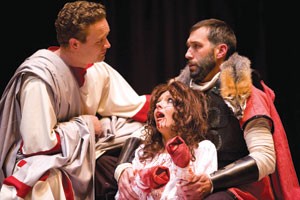If you still consider slasher flicks like “”Texas Chainsaw Massacre”” the epitome of blood-soaked horror, you clearly haven’t been watching enough Shakespeare.
Commonly regarded as the worst play the Bard ever wrote, “”Titus Andronicus”” has it all: murder, rape, dismemberment, cannibalism … and some ambiguous fraternal eroticism thrown in for good measure.
There is, given its premise, a marked lack of intricately witty banter and wistful soliloquy, but the Arizona Repertory Theatre makes sure you don’t miss either. Simply watching an unfortunate Roman war hero in the throes of madness is enough to drive one through the full two hours.
Kevin Black is brilliant in his portrayal of the tortured Titus, and the dynamic between brothers Chiron (John Shartzer) and Demetrius (Jonathan Kobritz) is downright disturbing at times.
Director Julie Taymor’s 1999 adaptation, “”Titus,”” made the 1623 revenge tale more surreal than a Dali painting, with some of the more poignant or brooding scenes lacking dialogue altogether. The ART seems to have taken cues from her, as far as theater staging allows. After Titus’s daughter Lavinia (Lauren Stinson) is ravished in the woods, her only scream is the one reverberating in the soundtrack, as blood gushes from her tongue-less mouth.
The sound design focuses on these kinds of sparse, eerie atmospherics, giving the scenes an almost cinematic quality. Not only does Goth queen Tamora (Claire Buchignani) deliver a chilling monologue; she does so bathed in ghastly purple light, a fountain of blood trickling down the banisters on either side. “”I’ll find a day to massacre them all,”” she bellows, “”and make them know what ’tis to let a queen kneel in the streets and beg for grace in vain.””
This is what the majority of modern guts-and-gore entertainment lacks: convincing psychology behind the violence. The relationships – especially that between Titus and Lavinia – are so compelling that even the cleanest, quickest death elicits a gasp from the audience. And if stabbing after stabbing borders on excessive, be assured: every wound has been earned.
So well earned, in fact, that the flat-screen display of stage directions is somewhat of a detractor from the performance. In the small Tornabene Theatre, to project “”He dies”” during a pivotal moment (even if simply to indicate Shakespeare’s original script) seems like a needless gimmick. The actors work hard to put the audience in the moment, only to be upstaged by a bunch of big white letters that may as well say “”Hey! You’re watching a play! Remember?”” As though all the jerking and gagging weren’t enough indication of a character’s death.
Fortunately, this feature is not abused, so it never becomes more than a minor annoyance.
The steep ticket price – $19 for students – is kind of a shame, though, considering the abundance of empty seats at the Sunday matinees.









